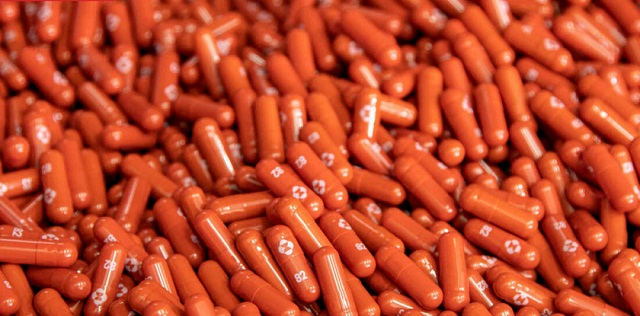
How antiviral pill that costs Shs2.4m per doze shot ahead in the COVID drug hunt
| THE INDEPENDENT | On November 4, the United Kingdom became the first country in the world to grant conditional authorisation to a drug used to treat COVID-19.
The Molnupiravir antiviral pill manufactured by the American multinational pharmaceutical company Merck becomes the first oral treatment to be approved against SARS-CoV-2; the virus that cause COVID-19 disease. By contrast, the other currently authorised drugs must be delivered intravenously or injected.
Molnupiravir has, in clinical trials, been shown to reduce the risk of hospitalisation and death in people with mild to moderate COVID-19 who are at risk of developing more severe disease.
The drug works by interfering with the virus’s genome as it multiples, creating mutations that disrupt replication and ultimately kill the virus. In clinical trials, people who took four pills twice a day for five days within five days of showing symptoms of a COVID-19 infection were 50% less likely to be hospitalized compared to those who took the placebo.
The UK has authorised the pill for conditional use in adults with mild to moderate COVID-19 and at least one underlying condition that puts them at risk for more severe disease, including obesity, diabetes, heart disease, as well as those who are older than 60.
The pill has been hailed as a “gamechanger” because it could make treating patients earlier on in their infection much easier — and more effective. It could also keep hospitals from overflowing, especially in places where vaccination rates are still low, such as many low- and lower-middle-income countries. Molnupiravir was so effective in a phase 3 trial involving COVID-19-positive people at risk of severe illness that clinicians halted enrolment early.
But whether this clinical-trial success story will translate into a global game-changer in the fight against the pandemic isn’t yet clear. Even if lower-income countries can afford the medicine, they might not have the diagnostic capacity to treat patients with molnupiravir early in the course of their illness, when treatment could make a difference.
Two Indian drug makers independently testing generic molnupiravir in people with moderate illness due to COVID-19 sought to end their trials in late September because they saw no “significant efficacy” for the experimental drug. They, however, planned to continue trials for people with mild illness.
Hit early, hit hard
The other therapies on offer against COVID-19, Gilead Science’s antiviral remdesivir and a monoclonal antibody cocktail from biotech firm Regeneron, must be administered intravenously or by injection. That makes it difficult for people to access the therapies before they are sick enough to land in hospital. And remdesivir is approved only for those who are already hospitalized with COVID-19.
Yet it’s better to “hit early, hit hard” with antivirals, says Richard Plemper, a virologist at Georgia State University in Atlanta. The sicker the patient, the less effective the drugs are at treating the illness. A COVID-19 pill, which simply requires a prescription and a trip to the pharmacy once symptoms appear, would make early treatment much easier.
COVID-19 is not the first disease caused by a coronavirus to seriously impact humans. But the 2002–04 severe acute respiratory syndrome (SARS) epidemic fizzled out quickly, and the Middle East respiratory syndrome (MERS) outbreak in 2012 never became widespread — meaning that drug makers had little incentive to develop antivirals against these diseases.
So when the first cases of COVID-19 emerged in late 2019, “there wasn’t a portfolio of antivirals waiting”, says Saye Khoo, an infectious-disease physician at the University of Liverpool, UK, who has led a clinical trial of molnupiravir.
Initial efforts to find treatments focused on drugs already approved by regulators, and yielded only one winner: dexamethasone, a steroid aimed at dampening an overblown inflammatory response in the sickest people.
But even as researchers scrambled to test approved drugs, pharmaceutical companies and biotechnology firms were scouring their libraries for any compounds with known antiviral activity that might stop the SARS-CoV-2 coronavirus. These broad-acting antivirals weren’t designed specifically to target SARS-CoV-2, but it seemed mechanistically feasible that they could.
Jay Luly, chief executive of Enanta Pharmaceuticals, a company in Watertown, Massachusetts, that is developing its own COVID-19 antiviral, told the scientific journal Nature that unlike with many of the drugs tested early in the pandemic, “there’s a scientific rationale. You understand how they’re working”.
So far, Gilead’s remdesivir is the only such drug that has received approval from the US Food and Drug Administration. When used in a hospital setting, its effect is modest. In a phase 3 trial, researchers found that it shortened recovery time by a median of 5 days. Merck hopes molnupiravir will be next to receive authorisation.
 The Independent Uganda: You get the Truth we Pay the Price
The Independent Uganda: You get the Truth we Pay the Price




